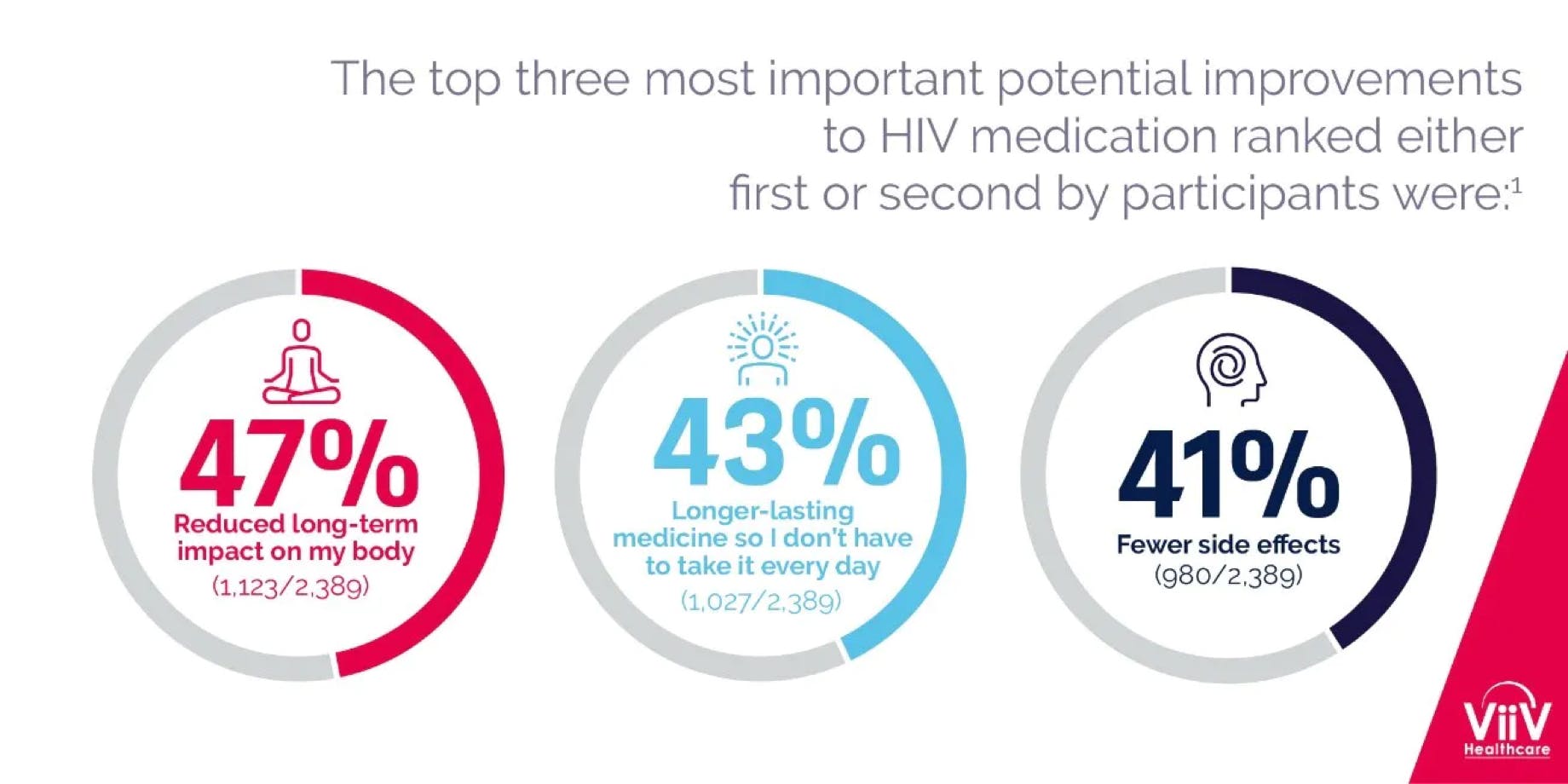PLHIV ASPIRE FOR ADVANCES IN HIV CARE

Since the advent of highly active antiretroviral therapy HIV has become a long-term health condition, as many people living with HIV with access to treatment are now living longer, healthier lives than before. However, Positive Perspectives study results indicate that many people living with HIV still aspire to treatments that have even less impact on quality of life.1
Data published in Population Medicine from the Positive Perspectives study, showed people living with HIV called for care and treatment innovations that address a spectrum of unmet needs and improve quality of life. Even among those study participants who were fully satisfied with their medication, three in five (61%, 639/1056) still reported gaps in their HIV management and aspired for new treatment choices.1


*Participants were asked to rank potential improvements by importance. When provided with seven choices, the above were ranked as either first or second in importance.
In the same study, open dialogue between people living with HIV and their healthcare providers has been associated with significantly better reported health outcomes.2 These patient-reported outcomes data demonstrate the benefits of people living with HIV feeling empowered to have open conversations with their healthcare providers about their quality of life (QoL) and treatment aspirations. Among study participants, 72% (1726/2389) reported being open to taking an HIV treatment composed of fewer medicines and 55% (1306/2389) reported being open to longer-acting (non-daily) HIV medication.1
Additionally, the Positive Perspectives study compared the self-reported health outcomes of those not fully satisfied with their HIV medication and management vs those fully satisfied, and found that those fully satisfied with both reported:1
- Significantly higher optimal treatment adherence (89% [372/417] vs 70% [763/1098])
- And higher optimal overall health (70% [293/417] vs 48% [525/1098])
“Listening to the individual preferences and concerns of people living with HIV is essential for improving health outcomes and reaching treatment goals. These Positive Perspectives study results published in Population Medicine tell us that people still have unmet needs for flexible treatments. Our ambition is for people living with HIV to continue striving for improved health-related quality of life and for their healthcare providers to proactively enable them to have open conversations about their aspirations.”
People living with HIV who participated in the Positive Perspectives study reported being optimistic about ongoing improvements in HIV care and treatment. For example, more than three in four (77%, 1842/2389) of study participants reported they believed that future advances in HIV treatment will improve their overall wellbeing.1
The Positive Perspectives study is one of the largest, global, HIV patient-reported outcomes (PROs) studies to date, with 2,389 people living with HIV participating from 25 countries. Participants were asked to rate their own health, how living with HIV impacts their lives and affects their outlook for the future, as well as examining their interactions and relationships with HCPs and their experiences with ART. All findings are self-reported.
Click the image below to read the full Positive Perspectives results report
The Positive Perspectives study is one of the largest, global, HIV patient-reported outcomes (PROs) studies to date, with 2,389 people living with HIV participating from 25 countries. Participants were asked to rate their own health, how living with HIV impacts their lives and affects their outlook for the future, as well as examining their interactions and relationships with HCPs and their experiences with ART. All findings are self-reported.
References
- de los Rios P, Okoli C, Young B, Allan B, Castellanos E, Brough G, Eremin A, Corbelli G M, Hardy W D, Van de Velde N; Treatment aspirations and attitudes towards innovative medications among people living with HIV in 25 countries; Population Medicine. 2020;2(July):23 DOI: https://doi.org/10.18332/popmed/124781
- Okoli C, Brough G, Allan B, Castellanos E, Young B, Eremin A, Corbelli GM, Mc Britton M, Muchenje M, Van de Velde N, de los Rios P. Shared Decision Making Between Patients and Healthcare Providers and its Association with Favorable Health Outcomes Among People living with HIV; AIDS and Behaviour. DOI: https://doi.org/10.1007/s10461-020-02973-4
YOU MAY ALSO BE INTERESTED IN:
Find out more about how taking multiple medications can affect quality of life for people living with HIV. Data from Positive Perspectives study (Wave 2).
While improvements in HIV care have been made, some people living with HIV still struggle with their HIV treatments. Results from the Positive Perspectives study highlighted barriers to adherence.
Global Positive Perspectives data demonstrate a strong link between high reported engagement with healthcare providers (HCPs) and positive self-reported health outcomes for people living with HIV, yet study results also show many do not feel comfortable raising important treatment issues.
If you get any side effects, talk to your doctor, pharmacist, or nurse. This includes any possible side effects not listed in the package leaflet. You can also report side effects directly via the GSK Reporting Tool link https://gsk.public.reportum.com/. By reporting side effects, you can help provide more information on the safety of this medicine.
If you are from outside the UK, you can report adverse events to GSK/ ViiV by selecting your region and market, here.




